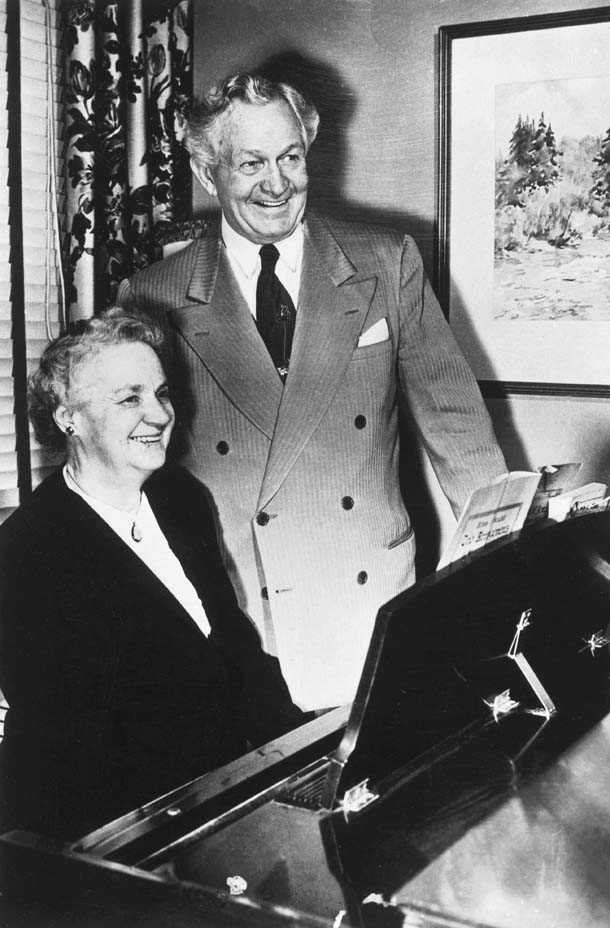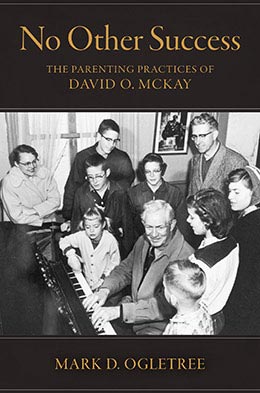Going with the Flow
Mark D. Ogletree, “Going with the Flow,” in No Other Success: The Parenting Practices of David O. McKay, ed. Douglas D. Alder (Provo, UT: Religious Studies Center; Salt Lake City: Deseret Book, 2017), 107-112.
“God has implanted deep in the souls of parents the truth that they cannot with impunity shirk the responsibility to protect childhood and youth.”
—David O. McKay[1]
 David O. and Emma McKay as grandparents. (Courtesy of Intellectual Reserve, Inc.)
David O. and Emma McKay as grandparents. (Courtesy of Intellectual Reserve, Inc.)
One of the great characteristics of teachers and leaders of youth is flexibility. Adults who have been given the charge to work with children and teens should understand the need to adapt and change according to the situation. After all, teens are often changing their minds as well as their direction. Good leaders and teachers can adapt to the circumstance. Fathers who also can adapt and be flexible will be successful.
Children change, grow, and mature throughout their lifespan. For each stage of their lives, their needs change. Successful fathers are able to change and acclimate to their children at various times and in different circumstances. Change and flexibility “can mean making shifts in one’s job or lifestyle for more time and energy with children.”[2] If a father has multiple children, those personalities will be unique in their own way, and diverse personality styles will be the cause of a diversity of interactions, challenges, and opportunities. For example, an oldest child’s passions, dreams, and interests may be very different than a younger child’s. Therefore, fathers must adapt from child to child and change their parenting styles to best fit particular situations. Obviously, a father cannot expect the same from his eighteen-year-old son as he would from a preschool-aged daughter.
Flexibility also implies being able to “go with the flow” and to keep your wits when there is a crisis. A father with this trait also does not get locked into thinking that his way is the only way to accomplish a certain task or that his idea is the only correct way to do something.
David O. McKay seemed able to adapt to most parenting situations, regardless of the stage of life or the circumstance. At one point in his life, he had to minister to his younger children, his children who were married, and his grandchildren. He appeared to do a excellent job meeting the needs of his children at every stage of their lives, regardless of their age.
Going with the Flow
Lawrence shared the experience of traveling with his father and mother to California when he was eight years old. When young Lawrence saw the ocean for the first time, his curiosity was piqued, and he deeply desired to pay a visit to the seashore. After a good night’s rest, Lawrence decided to explore the beach. He related the following:
I woke up very early next morning and set off with innocent enthusiasm to inspect the ocean close up, an expedition that involved crossing the speedway. The ocean was much more exciting this time. The tide was coming in, and the waves were thundering on the beach. I was totally engrossed in the spectacle when I realized, after some time, that someone was beside me. It was Father. He smiled at me and said, ‘It’s beautiful, isn’t it?’ Then, hand in hand, we went back and had breakfast.
In retrospect, particularly as a father myself, I can imagine how alarmed Mother and Father were when they awoke to find me gone and with what concern Father set out to look for me. But finding me safe, he chose not to communicate any part of that alarm to me. Instead, he simply shared the beauty of the ocean with me and made it an unforgettable memory for me.[3]
Part of David O. McKay’s wisdom and flexibility was his ability to always value relationships over rules or expectations. In the case of the “morning explorer,” it would have been easy for him to chastise his son or rebuke him for his wandering. Instead, David used this opportunity to connect with Lawrence and have a bonding moment together—something that was probably rare in the life of this busy Apostle. Preserving the relationship he had with his children was always paramount, more so than rules and regulations.
Animal Farm
Another change in David’s parenting is evidenced by the experiences that occurred as he tried to teach his children responsibility. He strongly believed that one of the best ways to instill responsibility was by having his children take care of animals. Lawrence was responsible for the family cow, and Llewelyn raised the chickens. There was also a family boar named Caesar. On one occasion when David was trying to hurry out the door to catch a train, he noticed that Caesar had broken out of his pen and was trotting down the street. Because time was of the essence, David had to hurry quickly to catch the boar, put him in the chicken coop, and make a mad dash for the train station. At 2:00 a.m. the phone rang at the McKay home, and the operator announced that there was a telegram for Mr. Lawrence McKay. “With their father away and such an unexpected call at such an obscure hour, the family feared the worse. Lawrence scribbled down the urgent message as the operator read him the telegram: ‘Caesar in chicken coop! Water him!’ Lawrence thanked the operator, and the entire house laughed with relief. One of the boys exclaimed, ‘That’s all the telegram said? Father must really love that ugly boar!’”[4]
One spring, Lawrence had untied the family cow so she could drink. She got away, and Lawrence was not sure where to find her. He approached his father to report that he had lost the cow. How would his father respond? Would David O. McKay be upset? Would he be angry? Would he convey disappointment? The answer is none of the above. Instead, David said to his son, “She’s probably started on her way to Huntsville. Let’s go and see.” As they traveled up the canyon, they discovered that someone had found the cow and tied her to a telephone pole partway up the canyon. “Father took the rope, wound it around her neck, and put a note on her halter: ‘Please let me pass, I’m going to grass.’”[5] Both father and son had a great laugh. Instead of rebuking his son or giving him a lesson on obedience and responsibility, David O. McKay seized the opportunity to spend some one-on-one time with his son and have a great laugh together.
Seasoned Fathering
President and Sister McKay still had young children at home when they were in their early sixties. In 1935, Lawrence would have been thirty-four; Llewelyn was thirty-one; and Lou Jean was twenty-nine. However, their younger children were still in high school and college. Emma Rae was twenty-two; Edward was twenty; and Bobby was fifteen. Like most men, President McKay had less energy and less stamina as he aged, especially when compared to his earlier years as a parent. Instead of working a full day at the Church Office Building in Salt Lake City and then heading to Huntsville to haul hay in the evening, David’s pace slowed with age. He still worked harder than the average man his age, and Ned and Bobby were constantly taken to Huntsville for work projects. However, President McKay expanded his involvement with his children into other areas. For example, he began to take more interest in taking his children to movies. His diaries are full of accounts of visiting picture shows, meeting his children at the theater, and taking the family to Fish Lake for some needed recreation.[6] In fact, although President McKay did not vacation that often with his older children, the younger children (Emma Rae, Ned, and Bobby) were the beneficiaries of visits to Yellowstone National Park and other exciting places.[7] And when it was time for Ned to leave for the German-Austria Mission, President McKay spent the day before his departure purchasing suitcases, clothing, and anything else a departing missionary might need.[8]
These are the type of fatherly activities that David may not have engaged in during his younger years. However, as he aged, he adapted to the needs of his children and took any opportunity he could to spend time with them. In a way, he changed his parenting philosophy from taking his sons to the family farm to doing things with his children that they seemed to enjoy.
Because David knew that the time he had with his children was precious, he seized those opportunities. Instead of focusing on correction or discipline, David was centered on building relationships. He understood from his professional teaching experience that the only way to influence young people is to have a connection with them. He also understood that to impact young people, parents and teachers must adapt and speak the youth’s language.
For example, as an Apostle in the Church, there is no question that David O. McKay was doctrinally sound. He could dialogue with the greatest scholars as a theologian and as an educator. However, he adjusted his approach when he taught children. He would use visual aids and object lessons to capture their attention. When a mother asked her children what they enjoyed most about a chapel dedication in California, one of them responded, “President McKay spoke to us children, and we could understand what he meant.”[9] Being able to adapt, change, and be flexible are traits of a strong and healthy father.
David O. McKay demonstrated this strength on many levels throughout his life. He understood that there is a time and season for everything. Most often, he valued relationships over rules. As a result, he formed a strong bond with each of his children. President McKay understood the importance of being flexible, and he seemed to improve with time as he learned to meet the needs of each child and grandchild.
Notes
[1] David O. McKay, in Conference Report, April 1969, 7.
[2] Dollahite, Hawkins, and Brotherson, “Fatherwork: A Conceptual Ethic of Fathering as Generative Work,” 32.
[3] McKay, My Father, David O. McKay, 100–101; see also David L. McKay, address at a Luncheon of the 17th Annual Meeting of the Mormon History Association, 8 May 1982, microfilm, MS 7013, CHL.
[4] Gary W. Toyn and Michael K. Winder, Life Lessons from Fathers of Faith: Inspiring True Stories about Latter-day Dads (American Fork, UT: Covenant Communications, 2010), 47.
[5] David L. McKay, interview by Gordon Irving, James Moyle Oral History Program, Salt Lake City, January–May 1984, 12.
[6] Diaries of David O. McKay, January–December 1935, MS 668, box 7, folder 13, Marriott Library.
[7] Diaries of David O. McKay, January–December 1937, MS 668, box 8, folder 2, Marriott Library.
[8] Diaries of David O. McKay, January–October 1936, MS 668, box 7, folder 14, Marriott Library.
[9] Gregory A. Prince and Wm. Robert Wright, David O. McKay and the Rise of Modern Mormonism (Salt Lake City: University of Utah Press, 2005), 17.
